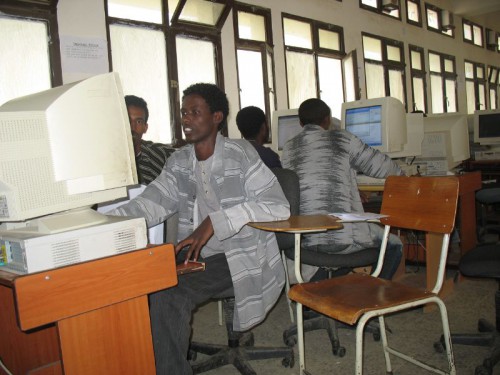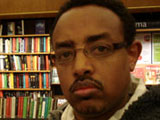Territorial Righteousness
by Mesfin Negash / October 5, 2012 / 5 Comments
Place and the ideas that transcend it.

The computer lab at Merkelle University, Ethiopia, 2007. Photo: Terri O'Sullivan.
At almost three years my life in exile has been short, compared with many veterans. But since my exile from Ethiopia I’ve developed an interest in how location or place affects the political and artistic life of people living in countries other than home. For those of us who continue to engage in the public debate from exile, the meaning of location has paramount value.

- Why does a country with her own unique alphabet and long history of writing persist to deny citizens the right to freedom of expression in this era of Expression? No other country in Africa may typify this paradox more than Ethiopia. As Leopold Senghor’s famous collection of poems entitled “Ethiopiques” remained ‘powerful and popula’ so does the source of his intriguing title, Ethiopia, in her own ways. In “Ethiopiques,” I share Ethiopian views on pertinent issues related to journalism, culture and, of course, the overarching subject of politics.

- Mesfin Negash is an Ethiopian journalist living in exile in Sweden. He is one of the journalists accused of “terrorism” in 2011 by the Ethiopian government. The co-founder and first editor-in-chief of an acclaimed Ethiopian newspaper, Addis Neger, he is currently the Managing Editor of Addisnegeronline.com. He is a political science student by training and known for his critical commentaries on significant political and social issues.
There are many issues we can discuss with regard to practical meaning of location in our public role. There is one fallacious argument, related with this, used to undermine people’s public engagement based on their place of residence. The argument, in general, goes like this: “You are not here; therefore either you cannot have a valid opinion on national matters,” OR “Due to your place of residence you have become less nationalist, less caring for our people” OR “You are no longer independent and (there is a possibility that) you became a traitor.” Surprisingly enough, people both at home and in the Diaspora employ this same argument.
“Territorial moralists/patriots” at home assume that due to the mere fact of being at home they are more well-informed and better citizens than anyone in the Diaspora. They believe so even if they don’t have any better information or contribution than a person in exile. I call this “territorial righteousness”—a friend of mine named it “territorial patriotism.” The proponents of “territorial righteousness” argue that anyone in exile has less right to citizenship, less information, less understanding, and less sympathy to national issues. These people ignore the technological revolution that has diminished the impact of distance and made the world as small as a village. I smile when a person from home, relying only on national TV and local newspapers, tries to criticize a compatriot in the Diaspora for lacking information. Actually, I have more sources (including those he relied on), than these kinds of people. True, it takes more effort to get all the information from a distant land; I am not denying the possibility of disorientation and disconnection that may come with a prolonged and uninformed life in exile, but this is a failure of the individual in question, which can be averted to a great extent. The territorial moralists/patriots have borrowed the term “long-distance nationalism” to criticize their political opponents in the Diaspora. They try to imply that a person cannot be an informed and responsible citizen unless he lives in his own country. What a fable!
The same goes for those in the Diaspora employing the argument of “territorial righteousness.” They think that most people at home, especially their political opponents, are less independent, less courageous, less nationalist, and less informed about the country’s problems and solutions. They believe they understand democracy better than people at home merely because they live in democratic countries. Without understating the opportunity that came with living in democratic societies to test the system first hand, it doesn’t give a moral authority to claim oneself a better defender of democracy than a person living under dictatorship. Of course, some of those in the Diaspora cannot tell how the political system of the country they live in works, nor do they internalize the democratic values celebrated in their neighborhoods.
Certainly no one can undermine the comparative advantages of witnessing events as they unfold and experiencing life as it is. But there are a few catches if one tries to argue that physical presence is the sole source of legitimate and informed engagement. First, being in a country doesn’t guarantee an automatic opportunity to witness events, nor to understand the event authoritatively. Two, it is almost impossible to witness each and every event, and there is no need to do so. Three, we live on shared information in this age of communication where real-time reporting is a click away.
Territorial righteousness/patriotism assumes an exaggerated value to the role of place in one’s opinion and public engagement. It intentionally undermines the role of technological innovations that have availed news and information from and to all corners of the world. On the other hand, the proponents don’t use this same distorted argument when it comes to people who share their views but live in a different place.
Why do people invoke this “argument by location”? Some like it because it gives them a sense of righteousness that comes without any additional effort beyond being where they already are. They want to sanctify their own position by sacralizing the value of being where they are. Others pick the argument because they don’t have any other defensible point against the person or idea being discussed. The few with political ends employ it to accuse their opponents of lacking authority that, they want to convince, stems from being in a place, whether it is relevant or not. But the whole argument is an over-simplification worth no response in most cases. If, as Mason Cooley suggests, “a real idea keeps changing and appears in many places,” wherever the person promoting or opposing the idea may be, it is better to invest in the ideas that will appear both at home and abroad.





5 Comments on "Territorial Righteousness"
Hi Mesfin, once you choose to leave away from home, whether you like it not your political significance becomes meaningless. The chance of forming and articulating political values also withered away with Addis Neger.
You might have put on the table every argument that supports your claim but most of us believe that you defected from the country without good evidence. We believe that yourself, Abiye and Tamrat take unfair advantage from the popularity and fame that you gained from publishing the newspaper. The problem is that all the three of u want to be seen as victims of the political system. In actual fact that is not the case u want to meet ur own end
Quite an interesting piece. It is true that someone will be more informed about Ethiopia residing in the developing countries than in Ethiopia provided that he/she is open to all information sources. I have personally experienced it. However, a person living in Ethiopia feels the real brunt of the political atmosphere more than anyone else. Sometimes you don’t need further information while you live the actual life. No information can worsen or improve the life I experience. The information that I get is the subjective interpretation of the true fact by a journalist or a pundit, but every one of us who reside in Ethiopia has a personal interpretation of our daily experience. My personal observation is enough to reach a certain political stance without adding additional information, who knows better than myself about my life. That’s why there is a stark difference between the public opinion in Ethiopia and in the diaspora. The later relies on second hand interpretation of the reality & sometimes on false information (both the extreme pro- & anti-EPRDF groups ). Nevertheless, both are Ethiopians (those who reside in Ethiopia & in the diaspora) hence can reach a certain political stance. However, those who live in the diaspora should not dictate those who reside at home which course to take to bring a better political system without having a first hand experience. This doesn’t mean that they can’t have any kind of stance how to improve the prevailing political atmosphere.
Sleshi,
The article posted here has nothing to do with the cause of exile. I have no reason to discuss with you the cause of my exile as you are here only to blame. As for the end of my significance in the discourse on Ethiopian issues, don’t rush to conclude. In the mean time, if you are so confident unblock our website, stop harassing reporters and informants contacting exiled based media.
You talked about an “unfair advantage.” Ridiculous. Unfair compared with what or who? What is fair advantage in this context? After all, what advantage? Thank you for admitting Addis Neger was a newspaper that could make us popular. But the newspaper was and still is more popular than the people who established it.
You are still arguing about the cause of our exile. If you don’t consider someone who is forced into exile and then sentenced to a fictitious crime a victim, then enjoy your justice.
You will probably have to define what the word “diaspora” mean to you before we can understand your point. You are a little too confused as it stands.
I am angry at Seleshi that he had blocked your website. He has to unblock it if he is confident really. In the meanwhile, please unblock me from commenting on your Addis Neger page if you are confident too. have a quick glance at yourself please. I always wonder why you ”for scholarship asylum seekers” don’t understand your ignorance but continue to mock our people. If I were you, I would refrain from writing such a trash and wait my silent death in one corner of Europe.